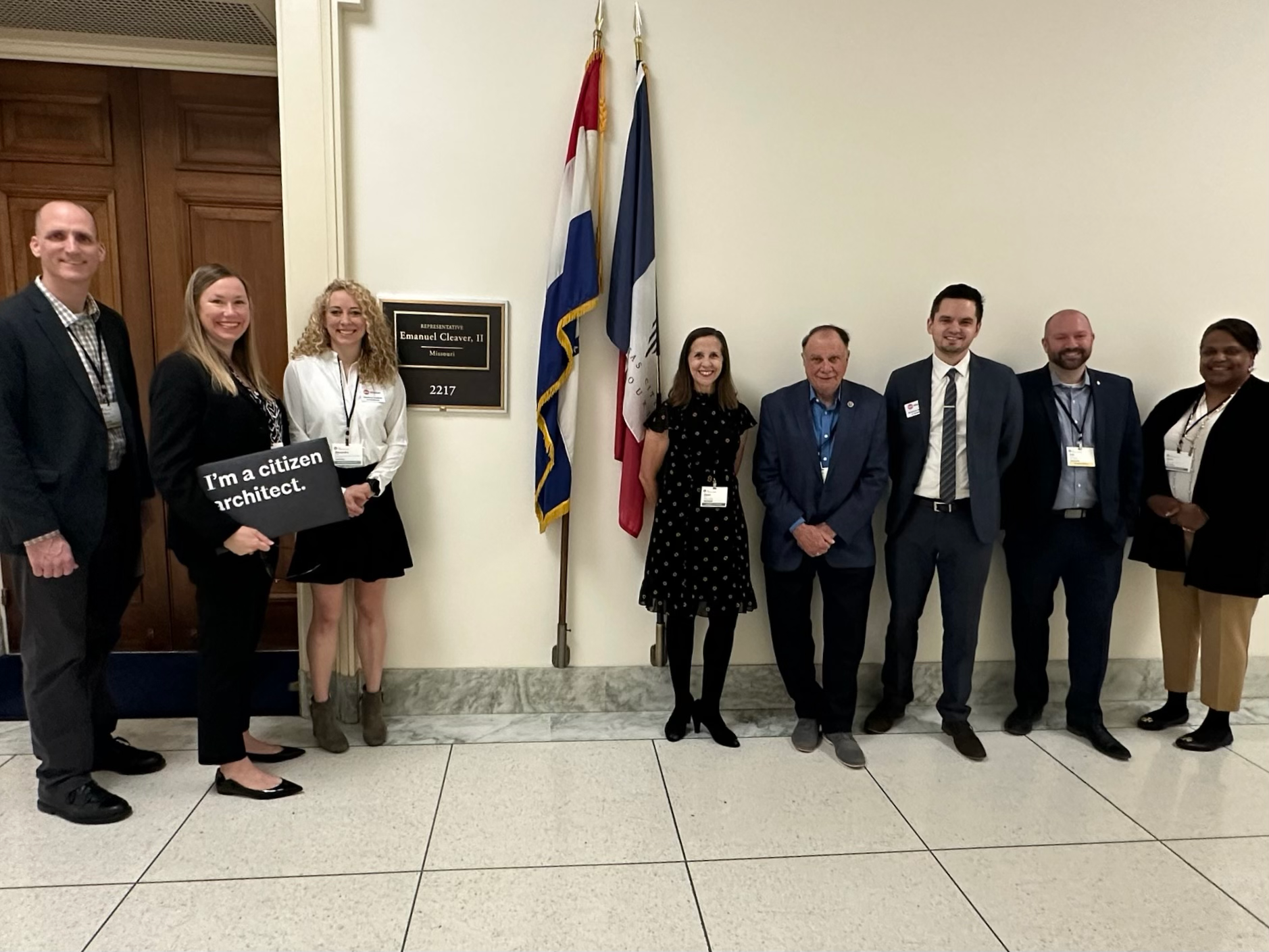As President-Elect of our local AIA chapter, I had the honor of participating in the AIA National Leadership Summit this past week, along with our executive director from AIA Kansas City, Dawn Taylor, and members of the AIA Missouri chapter. The Summit is an annual event that brings together the national leadership of AIA, local and state chapters, and sections to network and discuss AIA’s strategic priorities with Members of Congress to gain support for specific policies.
Our focus this year with Congressional leadership was to promote two bills: the Democracy in Design Act H.R. 5291 and the Resilient AMERICA Act H.R. 5689. These bills were presented last year with bi-partisan and bi-cameral support but never made it to vote. Our goal was to express AIA’s hope that the two bills would be re-introduced and co-sponsored again this year to be voted into law.
The first bill, the Democracy in Design Act, would codify that the executive branch can no longer determine a preferred style and outlaw certain styles of architecture for Federal projects. President Trump used an Executive Order in 2020 to do precisely this. This order banned Brutalist Architecture and called out Neoclassical, Georgian, Greek Revival, and other “traditional”styles as the preference – which the GSA adopted as a rule, not a preference, in subsequent RFPs. This E.O. was quickly repealed by President Biden when he took office, as the order was widely maligned and vehemently opposed by architects across the country.
Secondly, the Resilient America Act requests increased funding through the Building Resilient Infrastructure and Communities (BRIC) program to bolster grant funding to local communities for everything from residential resilience projects to building code adoption or enforcement. This bill is essential for many reasons, including helping communities to fund their Climate Action plans. Per the congress.gov website:
The bill
- increases from 6% to 15% the estimated aggregate amount of grants that may be set aside for national public infrastructure pre-disaster hazard mitigation assistance;
- makes private nonprofit facilities eligible for technical and financial assistance for implementing cost-effective pre-disaster hazard mitigation measures;
- provides funding for water resources development projects; and
- expands the use of hazard mitigation assistance to cover certain activities pertaining to wildfires, tsunamis, and ice storms.
We talked about how Bills have been passed and introduced in the State legislation of Missouri to remove or reduce building codes. This action is an extremely dangerous path, as we witnessed with horror and sadness in Turkey and Syria this past month. Building codes had been repealed as an attempt to expedite construction and lower costs, and now over 30,000 have died as a result – a devastating consequence.
The Democracy in Design Bill and Resilient America Bill still have support. Our Missouri group had good meetings with Senator Eric Schmidt’s office, Congressman Emmanuel Cleaver’s office, and others. It was inspiring to walk the halls of the administrative offices of the Capital, seeing other architects from all over the country meeting with their Representatives and Senators, feeling like we were actually making ourselves visible and heard.
We need to continue this work through follow-up and continued communication with our Officials, which the local and state Board are committed to doing. But it is also imperative, and I can’t emphasize this more strongly, for the AIA membership to fund the work of our National AIA lobbyists through ArchiPAC and MAPAC. It takes financial support to stay in front of our lawmakers to ensure that Architects are empowered to do the good work that we are trained to do. Even $100 from each firm would go a long way.
What has become very clear to me, as I’ve practiced over the past 25 years and am re-engaging our political system, is that very real forces are working to reduce our relevance, authority, and stature to shape the built environment as licensed architects. Let’s all work together to ensure this does not happen.




